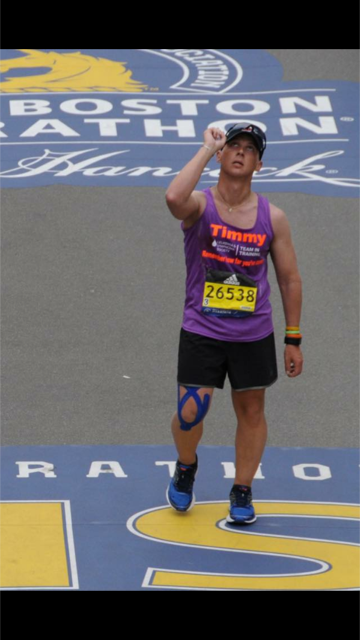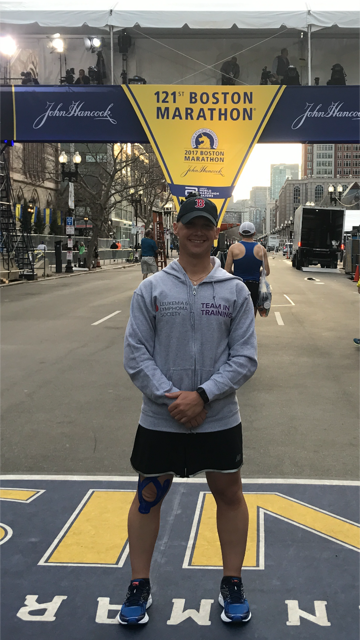Inspired Together: A cancer survivor’s journey from patient to Boston Marathon runner
By Carolyn Kimmel
If someone had told Tim Harner a year ago that he would run in the Boston Marathon this month, he likely would have laughed – or cried— because the number one item on his bucket list seemed so unattainable.
Yet on April 17, he crossed the finish line of one of the nation’s top races, living the message that he wants to give other cancer survivors: “Never give up hope. Live life; don’t let life live you.”
Harner, a lifelong runner, was just 29 years old when he was diagnosed with acute myeloid leukemia, a cancer of the blood and bone marrow that progresses rapidly. His diagnosis in November 2015 began a journey that would challenge his resolve to live but ultimately transform his life.
“Nothing will beat this feeling. I am in the best shape of my life mentally, physically, spiritually and emotionally. And most of all, now I can give other people hope,” the Tower City resident declared a day after finishing the 2017 Boston Marathon. “Cancer was the best thing that’s ever happened to me. It woke me up to so many things in life. I wasted so much time worrying about petty, stupid stuff. So many people are hamsters on a wheel. Jump off and enjoy life.”

Tim Harner crosses the finish line of the Boston Marathon.
Inspiration from someone who has been through adversity – literally right up against the point of death – rings true: Harner has hope, and that’s why he shares his story.
“In October 2015, I started feeling different. My usual time was an eight-minute mile, but I felt my pace getting slower and slower. It went to a 10-minute mile and I could barely make four miles before I’d have to stop and catch my breath,” he said. “But you know men and our arrogance; we never admit anything is wrong. I was working two jobs, seven days a week. I found every excuse I could as to why this was happening.”
By early November, when he could run only a block, he couldn’t deny it any longer. A trip to his family doctor followed by subsequent blood work and a bone marrow biopsy showed the unwelcome truth.
“My first thought was ‘I’m going to die at 29.’ Eight people in my family have died from cancer, including my grandmother who died of AML. The doctor told me how aggressive mine was and that the only thing that might save my life was a bone marrow transplant,” said Harner, who immediately started chemotherapy at Penn State Cancer Institute and was in and out of the hospital for the next five months with episodes of fevers and sickness.
“Many times I said I was going to give up, but thankfully the nurses are 10 times more stubborn than me and they wouldn’t let me,” said Harner.
One of those nurses was Jenna Hill.
“I believe being that positive voice and having a positive attitude, even when your patient is not very positive, makes a huge impact on our patients’ outcomes,” Hill said.
Harner and Hill found a rapport early in his care because they are the same age and both from Schuylkill County, where their high schools were sports rivals. Plus, Hill said, Harner has a very outgoing personality, which made it very easy to relate to him and talk about his plan of care.

Tim Harner
Harner credits the family-like bonds he formed on the seventh floor oncology unit with getting him through his bone marrow transplant on March 2 of last year. The procedure uses high doses of chemotherapy to destroy cancer cells and shut off the patient’s immune system to lessen the chance of rejecting healthy stem cells from a bone marrow donor.
“April 6 is my birthday, but March 2 is my real birthday now,” said Harner, who is convinced his new life – both physically and emotionally – began with that second chance at life.
First, though, there was a big hill to climb. By day seven, his body began rejecting the foreign stem cells and he developed ulcers in his esophagus that made swallowing akin to “drinking shards of glass,” he said. He didn’t eat or drink anything by mouth for nine days.
Even as he slowly improved and was ready for discharge by the end of March, his fight was far from over. Last summer, so fatigued that he wondered if he would ever run again, he slipped into a depression fueled by survivor’s guilt and an aching need to know why his life had been spared.
Then came a ray of hope: his doctor told him about the Leukemia & Lymphoma Society’s Team in Training, a sports endurance program that raises money for blood cancer research. There were 60 spots on the team training for the Boston Marathon.
“My entire life, all I ever wanted to do was run the Boston Marathon,” Harner said, noting how difficult it is to gain entry. “I didn’t think I’d get chosen, but I applied in July 2016.”
On Nov. 10, one year after being diagnosed with AML, Harner received a phone call that he made the team; he would run in the 2017 Boston Marathon.
“The next day, I put on my running shoes and ran four miles like it was nothing,” he said. “That phone call saved my life; it gave me a sense of purpose.”
Over the next four months, Harner increased his endurance. By the end of March, a little more than a year after his transplant, he could run 20 miles. He traveled to Boston several times to train with his teammates, six of whom were fellow survivors.
On race day, Harner was confident but a little worried that he might be overcome with emotion at how far he had progressed in a year. It turned out that thought would push him to run harder in the last miles of the 26.2- mile race.
At the seventh floor nurses’ station at the Medical Center, the nearby big screen TV was tuned to the Boston Marathon and some nurses were tracking Harner’s progress via apps on their phones.”
“We were in Hershey, but we were right there with Tim, cheering him on,” said Emily Hull, another of Harner’s nurses. “It’s hard for me to believe that a patient, after going through what he went through, could run for 26 miles.
“To have had the privilege to care for Tim and knowing the care he received at Penn State Cancer Institute was part of the reason he was able to run the Boston Marathon is the reason that I do what I do,” echoed Hill.
Team in Training raised $800,000 in pledges, $12,500 of which Harner raised himself.
“I now understand why I survived – to give people hope,” said Harner, who is cancer-free, has returned to his job in golf operations at the Hershey Country Club and hopes to start a second career as an inspirational speaker. “You can’t change the past or predict the future; all you can do is enjoy now.”
When Harner returns to the Cancer Institute for checkups, he always stops in to see his seventh-floor family.
“He walks right onto the floor with this big, cheesy grin and no matter what kind of day you’re having, he brightens it up,” Hull said. “Despite our best efforts, some patients unfortunately don’t always do well – the cancer gets the upper hand – but here’s one that exceeded our expectations. That’s makes us really happy for him.”
If you're having trouble accessing this content, or would like it in another format, please email the Penn State College of Medicine web department.
